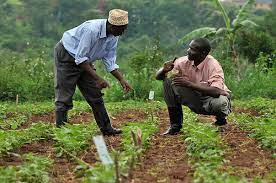Nigeria’s Agricultural sector has contributed 24 percent to the country’s Gross Domestic Product (GDP) says Permanent Secretary, Federal Ministry of Agriculture and Food Security, Mr Temitope Fashedemi.
According to Fashedemi, the sector also employed over 70 percent of the population with predominantly smallholder farmers, adding that a very critical reason for emphasis must be on climate resilience in the sector.
He stated this at the inception workshop on the Abatement of Short-Lived Climate Pollutants (SLCPs) in the Nigerian Agricultural Sector project on Tuesday in Abuja.
The workshop aimed to reduce open field burning (No Burn Alternatives) in the sector.
Fashedemi was represented by the Director, Agricultural Lands and Climate Change in the ministry, Mr Osadiya Olanipekun.
Fashedemi said that the ministry of agriculture is responsible for developing the agricultural sector of the Nigerian economy with a view to growing the sector, driving income growth, accelerating food and nutrition security among others.
ALSO READ: Kebbi, FG begin 2023/2024 aerial spray to control Quelea birds
“However, in achieving this mandate, climate change is expected to increase the existing challenges faced by agriculture as food security and climate change are closely linked.
“There are key opportunities that exist in the sector to transform climate-smart systems that address both food security and climate change,” he said.
He said that open burning has been traditionally used as a cost-effective method for agricultural management.
Fashedemi said that Nigeria is one of the few countries to highlight its commitment to reduce SLCPs.
The permanent secretary said that this is part of Nigeria’s effort to mitigate the effect of Climate Change in the country.
Also speaking, the Country Director, Self Help Africa, Nigeria, Mrs Joy Aderele, said that SLCPs are dangerous air pollutants responsible for various negative impacts on human health, agriculture and ecosystem.
She said that SLCPs are a group of pollutants that have a relatively short lifetime in the atmosphere of a few days to about a decade and a half in the atmosphere.
ALSO READ: Afreximbank, CDP sign MoU for €100m facility to support food security in Africa
Aderele said the SLCPs is an 18-month pilot project to work with 500 farmers participants to reduce open burning.
She said that other participants in the project included 45 agricultural extension officers across the geo-political zones in the country.
Aderele said that Gboko Local Government Area in Benue would be used as a pilot to demonstrate successful approaches to reducing open-field burning.
The Project Manager, Self Help Africa, Mr Julius Awu, in a presentation, said that one of the objectives of the SLCPs project was to contribute towards Nigeria’s goals of low carbon development and emissions reduction.
NAN


